
Această recenzie poate conține spoilere
A HEARTBREAKING YET BEAUTIFULLY CRAFTED FILM
*Uprising* is a heartbreaking yet beautifully crafted film that takes us on an emotional journey through the friendship of Jong-Ryeo and Cheon-Yeong, set in a time of brutal class divisions in historical Korea. The plot centers on how the rigid social hierarchy affects their lives, particularly Cheon-Yeong, a slave who is forced to endure countless hardships in place of Jong-Ryeo.What starts as a cruel situation—Cheon-Yeong being beaten in Jong-Ryeo’s stead—evolves into a deep bond. Despite the fact that Cheon-Yeong isn’t born a slave, his family’s downfall forces him into this role, and it's his strength and refusal to accept the established hierarchy that makes him stand out. When he begins secretly teaching Jong-Ryeo how to fight, the dynamics between the two change, leading to a friendship that feels genuine despite the social disparity.
However, the film doesn’t shy away from the harsh realities of their world. Even after helping Jong-Ryeo win a prestigious sword-fighting competition, Cheon-Yeong is denied his freedom by Jong-Ryeo’s father, who breaks the promise of releasing him from slavery. This betrayal deeply scars Cheon-Yeong, though Jong-Ryeo still tries to protect him by sending him off to fight the Japanese invaders, hoping this will finally earn him his freedom. The film is filled with these moments of hope and crushing disappointment.
After years of fighting, Cheon-Yeong returns home only to find the world he left behind in ruins. Jong-Ryeo’s family home has been burned down by the people who suffered under the oppressive rule of his father. In one of the film’s most gut-wrenching moments, Cheon-Yeong tries to save Jong-Ryeo’s wife and son from the flames, but she refuses his help out of pride, seeing him as a slave rather than a person who might save her life. Her death serves as a stark reminder of how deeply ingrained social prejudice was, even to the point of self-destruction.
The climax of *Uprising* sees a tragic reunion between Jong-Ryeo and Cheon-Yeong after seven years of separation. Jong-Ryeo, unaware of the full story, initially believes Cheon-Yeong is responsible for his wife and son's deaths. Their final confrontation is tense, but as the truth is revealed, the film shifts focus from their conflict to a bittersweet reconciliation. Just when they finally resolve their long-standing misunderstanding, Jong-Ryeo is mortally wounded in battle against the Japanese. Cheon-Yeong kills the Japanese leader, Genshin, in a satisfying act of revenge, but it’s too late to save Jong-Ryeo.
In Jong-Ryeo’s final moments, he asks Cheon-Yeong if they’re still friends, referencing an earlier lighthearted exchange from their youth. It’s a poignant moment that captures both the tragedy and beauty of their relationship. Despite everything that has happened, the film shows that love and loyalty can persist, even in death. This scene is devastating, but it offers closure, showing that their bond was real despite the cruel world they lived in.
On a larger scale, *Uprising* also critiques the corruption of the ruling class, embodied by King Seonjo, whose greed and cowardice lead to the suffering of the common people. His alliance with the Japanese and subsequent desertion of his own throne during the invasion sparks the uprising that defines the film. The subplot involving Seonjo and the infamous Japanese leader Genshin, known as the “nose-snatcher,” adds layers of historical context and brutality to the narrative. In a symbolic twist, Seonjo’s greed is punished when the treasure he’s promised turns out to be boxes of human body parts—noses, to be precise—reflecting the horrors of war and the consequences of his betrayal.
In the end, Cheon-Yeong and a few of his fellow survivors form a new community, symbolically named “Beom Dong,” meaning “A world together.” It’s a hopeful note to close the film on, but *Uprising* doesn’t let the audience forget the price paid for such unity. The film leaves you with a lingering sense that although there’s hope for change, the struggle against social inequality is far from over.
*Uprising* masterfully balances personal and political themes, offering a powerful meditation on friendship, loyalty, and the fight for justice. It’s a tearjerker that hits hard, especially as it reveals the lasting impact of societal divisions, even as it tries to inspire hope for a better future.
Considerați utilă această recenzie?
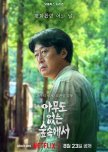
In the Forest With No One
103 oamenii au considerat această recenzie utilă
A frog (or frogs) dies from a stone thrown inadvertently
The Frog refers to an old Korean saying, “A frog dies from a stone thrown inadvertently”, which means people’s actions can have unintended negative consequences for others.“The Frog” is a pulse-pounding mystery thriller that seamlessly blends psychological tension with a high-octane narrative, making it a standout in the genre. Set across two distinct timelines, the series intricately weaves the fates of two men—Jeon Young-ha and Koo Sang-jun—whose lives are irrevocably altered by the presence of mysterious strangers and tragic events.
Young-ha, a reserved pension owner deep in the forest, finds his quiet life shattered when the enigmatic Yoo Seong-ha checks into his property. What begins as an innocuous visit quickly spirals into a nightmare as Seong-ha’s obsession with the pension pulls Young-ha into a game of manipulation, fear, and survival. Her presence is not just a disruption; it’s a catalyst for a series of increasingly disturbing events that push Young-ha to the brink.
In parallel, the series revisits the summer of 2000, where Sang-jun, a well-meaning motel owner, faces a different kind of horror. During the IMF crisis, a single act of kindness—offering a room to a stranded stranger—leads to an unthinkable tragedy that destroys his family and his livelihood. The show explores the psychological unraveling of Sang-jun as he grapples with guilt, public scorn, and the slow disintegration of his once-happy life.
Chief Yoon Bo-min, a tenacious detective who connects both timelines, adds another layer of tension as she digs into the mysterious happenings, driven by an intuitive sense of something deeply wrong. Her pursuit of the truth brings her dangerously close to the chaos surrounding both men.
The narrative is tightly wound, with each episode ramping up the stakes. The show is visually stunning, with beautiful mise-en-scenes that contrast the serene settings against the underlying dread.
One negative thing I found was that the transitions between the two timelines were not very seamless and can be confusing at first.
The terror comes from within—how far ordinary people can be pushed before they break.
In essence, “The Frog” is a suffocating, high-stakes drama that examines the devastating consequences of guilt, obsession, and the human capacity for both resilience and destruction. It’s a ride that leaves you breathless, with each episode escalating in intensity until the explosive conclusion.”
Considerați utilă această recenzie?
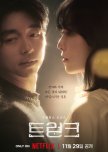
Love is temporary and marriage is a service
"The Trunk" is an enthralling mix of romance, mystery, and emotional drama that intricately weaves together the lives of its complex characters. At its core, the series explores the fragility of human connections and the lengths people go to protect their secrets, blending suspenseful twists with deeply personal moments.The story centers around Noh In-ji, a field wife working for a marriage service company, and Han Jeong-won, a gifted but emotionally fractured music producer. When they enter a contract marriage, both carry emotional baggage that gradually surfaces—In-ji from a string of failed relationships and a painful betrayal, and Jeong-won from a past haunted by unresolved guilt and a toxic relationship with his ex-wife. Their initially transactional bond slowly transforms, revealing their vulnerabilities and sparking an unexpected intimacy.
What sets *The Trunk* apart in the ocean of contract marriage K-dramas is its ability to balance layered storytelling with sharp social commentary. The concept of contract marriages serves as a metaphor for modern relationships—transactional yet yearning for depth. The show doesn't shy away from themes like betrayal, emotional manipulation, and the scars of childhood trauma, but it handles them with sensitivity and nuance.
The characters are the lifeblood of this drama. Noh In-ji is a fascinating protagonist—a woman who seems unshakable on the surface but harbors deep emotional wounds. Her journey of self-discovery is as compelling as her dynamic with Jeong-won. Han Jeong-won, meanwhile, is a man trapped in his past, struggling to reconcile his unresolved feelings for his ex-wife with his growing affection for In-ji. The supporting characters, particularly Jeong-won's enigmatic and complex ex-wife Lee Seo-yeon and the unsettling stalker Eom Tae-seong, add layers of intrigue, ensuring the plot never loses its momentum.
The production quality is top-notch. The cinematography captures both the tension and intimacy of the characters’ lives, with dimly lit interiors and wide shots of isolated landscapes mirroring the characters' emotional isolation. The music, composed with a mix of melancholic strings and ambient tones, enhances the mood, making even the quietest moments resonate deeply.
Ultimately, The Trunk is more than just a romance. It’s a deeply human story about facing the shadows of the past, learning to trust, and finding meaning in unexpected connections. The title trunk does not point toward the actual trunk. the trunk here is metaphorical, about all the past traumas each character carries.
Considerați utilă această recenzie?
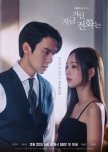
The Number You Have Dialed
110 oamenii au considerat această recenzie utilă
A Tense Thriller That Keeps You HOOKED!
*When the Phone Rings* is one of those K-dramas that keeps you at the edge of your seat, with its pulse-pounding suspense and a story that digs deep into the fragility of trust and human connections. The premise itself is chilling—a seemingly happy arranged marriage slowly unravels after a terrifying phone call from a kidnapper, leading to a series of events that reveal painful truths about the characters. I was hooked from the very first episode, constantly wondering where it was all going.What I really appreciated about the show was how it made me question not just the couple's relationship, but the very nature of guilt, secrets, and the things people hide behind closed doors. The chemistry between Yoo Yeon-seok and Chae Soo-bin felt real, and they both delivered some truly raw and emotional performances, especially when their characters were put under pressure. The writing does an excellent job of creating tension that doesn’t let up, and each twist felt like a blow to the gut.
*When the Phone Rings* was a thrilling ride, and I’d recommend it to anyone who loves a tense psychological drama. It's a reminder of how easily things can fall apart, and how sometimes, the hardest thing to face is the truth we’re too afraid to acknowledge. The journey was definitely worth it.
Considerați utilă această recenzie?

Time Walking on Memory
34 oamenii au considerat această recenzie utilă
This is a bad drama!
This is predictable and boring, hence a bad drama! Overused concept, like, is it 2010?They should stop making shows like these now!
A borefest from start to end. I was going to drop it at ep 3, but one of my ex-friends threatened to pull my nails out, so I had to waste my time over this.
Anyone who finds this drama good needs to get some help. There is something seriously wrong with them up there.
Considerați utilă această recenzie?
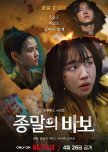
The Fool of the End
17 oamenii au considerat această recenzie utilă
A good philosophical show with a bad pilot
The first three episodes present a disorienting experience for viewers, with a narrative structure that lacks clarity and coherence. The plot jumps haphazardly between different timelines without clear indication, leaving audiences struggling to piece together the sequence of events. Flashbacks blend seamlessly with present-day scenes, further complicating the understanding of the storyline. This lack of a clear timeline detracts from the overall viewing experience, making it challenging for viewers to fully engage with the narrative.Furthermore, the abundance of characters introduced in the early episodes adds to the confusion. While an extensive cast can enrich the storytelling by providing diverse perspectives, this show struggles to effectively develop each character amidst the chaos of its narrative. As a result, many characters feel underutilized or underdeveloped, diminishing their impact on the overarching plot.
Despite its shortcomings, it" begins to find its footing in the fourth episode, as the narrative begins to coalesce and the timelines become more discernible. The characters, once disparate and disconnected, begin to intertwine in meaningful ways.
So, is a philosophical drama with grand aspirations, marred by its initial confusion and lack of coherence. While the early episodes may leave viewers feeling adrift in a sea of disjointed narratives, the series gradually finds its footing and delivers a more cohesive and engaging experience.
Considerați utilă această recenzie?
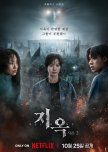
Hellbound Season 2
18 oamenii au considerat această recenzie utilă
Această recenzie poate conține spoilere
A Thrilling Descent into Chaos
*Hellbound* Season 2 wastes no time plunging viewers back into its dark, morally complex universe where divine judgment and human corruption intertwine. This season raises the stakes, delving deeper into the mysteries surrounding the resurrection phenomenon while expanding its character dynamics in ways both shocking and exhilarating.The return of Jinsu (Kim Sung-cheol): His visions and ultimate transformation into one of the very monsters that once terrified humanity underscore the show’s central theme: no one is above judgment, not even the messiah-like figures they create.
Kim Jeongchil’s political machinations, in alliance with the government, form another key pillar of the season. His desperate attempt to maintain control over the New Truth by using Park Jungja (Kim Shin-rok) as a pawn adds a layer of intrigue and treachery.
Thematically, this season explores the devastating consequences of blind faith and power-hungry institutions. The New Truth’s “Resurrected One” plan, though initially grand in its ambition, becomes a symbol of their crumbling control. The demonic monsters serve as an ever-present reminder that divine retribution, though wielded by men like tools, remains uncontrollable and terrifying.
Meanwhile, Hyejin (Kim Hyun-joo) continues to act as the moral center of the show, pushing against the tide of corruption and madness. Her rescue mission for Park Jungja is one of the season's most thrilling arcs, showcasing her resilience and determination to protect the innocent, even in the face of overwhelming odds. The poignant moment of Jungja reuniting with her son provides a much-needed emotional reprieve amidst the chaos.
Director Yeon Sang-ho masterfully balances action, horror, and character-driven drama, creating a tense, chaotic atmosphere that builds relentlessly toward the finale. The introduction of new power players like Senior Secretary Lee, who manipulates events from the sidelines, adds political intrigue that complements the show’s exploration of spiritual fanaticism.
While the season provides plenty of answers, it also raises new questions, particularly about the resurrection and the true nature of divine judgment. The ending leave the future wide open for another chapter, rife with potential.
In short, *Hellbound* Season 2 intensifies its exploration of morality, faith, and the consequences of power, delivering a season that is as thought-provoking as it is thrilling. It masterfully intertwines human emotion with its dark, supernatural premise, making it a must-watch for fans of psychological and religious horror.
Theories I found good:
While Jin-su taunts Se-hyeong for wasting his last chance by trusting Jin-su, it is ultimately proven to be Jin-su who wastes his resurrection. He spends his second chance the same way he did most of his first life: selfishly, seeking a salve for his emotional pain without care for the pain he knowingly inflicts on others. Jung-ja’s declaration is its own kind of decree, as Jin-su realizes they are not the same.
Jae-hyeon may have a latent power, just as Jung-ja does.
What we do in this life—and how we care for each other—does matter. Even when Jin-su came back from hell, he feared he might still be in it. We create our own hell, individually and collectively, and even when there is a supernatural power also getting in on the game.
Stories have power, and Hye-jin is giving Jae-hyeon a good and true one. It is the kind of story that Jin-su was never told when he was little and alone. The kind of story Secretary Lee, the New Truth Society, or the Arrowhead would never bother telling because it doesn’t feed the kind of fast, uncaring power they are looking to grow. The kind of story Detective Jin Kyung-hun (Yang Ik-june) tells his daughter, Hee-jung (Lee Re), as she dies from cancer in his arms. Hee-jung lived most of her life under the thrall of Jung Jin-su and his empty promises, but it’s a family picture, a story of love, that gives her comfort in her final moments.
Considerați utilă această recenzie?

A Gritty Crime Thriller Where Revenge and Corruption Collide
*Gangnam B-Side* (as of Episode 6) has proven to be a gripping and intricate drama, blending intense character development, dark themes, and a maze of morally complex choices. Set in the underbelly of Gangnam, it explores the dangerous world of power, corruption, and the exploitation of vulnerable people. The show does a great job of painting its characters as deeply flawed yet compelling, particularly with its leads, who are constantly caught in the tension between seeking revenge and protecting those they care about.The central plot revolves around the criminal activities of Gangnam Trading, led by Joon-seo and various other powerful figures, including Choi and Tak. The illegal trafficking of drugs like Neon and the exploitation of escorts add a sense of urgency and suspense to the narrative. Characters like Dong-woo and Gil-ho have become somewhat tragic figures, driven by guilt, revenge, and a sense of justice, though often falling short in their attempts to protect others.
The pacing has been relatively well-balanced, with the first few episodes establishing key relationships and tensions, while episodes 4 through 6 really ramp up the stakes. There’s a delicate interplay of personal vendettas and larger criminal conspiracies, and the show delves deep into the emotional toll these secrets take on its characters. Episode 6, in particular, marks a turning point with a huge revelation regarding Gil-ho’s past and his identity, which adds another layer of mystery to his motivations.
The themes of power, betrayal, and guilt are consistently explored throughout the episodes, with each character’s arc being carefully developed. While the show can be dark and at times a little slow in its buildup, it rewards patience with intense moments and twists that keep the viewer invested. The cinematography, particularly the use of neon lights and the atmospheric tension of the scenes, also contributes significantly to the show’s tone.
There are hints of resolution in the near future, but with two episodes remaining, it seems that *Gangnam B-Side* still has plenty of dramatic developments to unfold. The final episodes are likely to tie together the fates of its main characters, who have been caught in a web of crime and vengeance, though it’s unclear who will come out on top in the end.
In short, *Gangnam B-Side* is a tense and thrilling watch that pulls you into its gritty world of crime and power, while exploring complex character dynamics and deep emotional stakes. If you're a fan of dark crime dramas that blend mystery with intense personal conflicts, this show is definitely worth a watch.
Considerați utilă această recenzie?
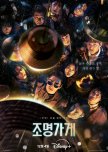
Shop of the Lamp
39 oamenii au considerat această recenzie utilă
Această recenzie poate conține spoilere
A Soul-Stirring Exploration of Life, Death, and Redemption
"Light Shop" is an emotionally gripping and thought-provoking narrative that masterfully blends supernatural intrigue with deeply personal stories of love, loss, and redemption. This series takes viewers on a poignant journey through the lives of characters who are trapped between life and death, all connected through an enigmatic light shop. With its rich character development, stunning visuals, and poignant exploration of the human condition, this show stands out as a must-watch for fans of supernatural dramas and psychological thrillers.PS: If anyone doesn't want any spoilers, scroll straight to the "conclusion" part.
Plot and Storytelling:
The concept of "Light Shop" is deceptively simple but profoundly complex. At its heart, it is a story of interconnected souls—each character grappling with their own past, regrets, and unfulfilled desires. What begins as an eerie, horror-like atmosphere, gradually transforms into an exploration of hope and second chances. Light Shop itself serves as a metaphorical crossroads where souls meet and interact, discovering not just the truth about their own lives but also the way their destinies are woven together.
The storytelling is nuanced, shifting seamlessly between different character arcs that initially seem unrelated. However, as the narrative unfolds, the viewer begins to see how these disparate lives intersect, all leading to a heartbreaking yet redemptive climax. Each episode builds tension, gradually revealing the layers of each character's tragic past and the complex emotional journeys they undergo. The pacing is well-balanced, ensuring that while the story has its emotional moments, it never feels rushed or heavy-handed.
Character Development:
The strength of "Light Shop" lies in its cast of deeply human characters, each of whom brings a unique perspective to the story. From Jeong Won-yeong, the mysterious and compassionate guardian of the afterlife, to Lee Ji-young, a woman whose love for her deceased boyfriend transcends death, each character is richly layered, with their own emotional baggage and desires. Their arcs are deeply interwoven, creating an intricate web of relationships that explores the themes of sacrifice, memory, and the pain of unspoken love.
Particularly compelling is the tragic story of Kim Hyun-min and Lee Ji-young. Their love transcends the boundaries of life and death, with Lee Ji-young's determination to save Kim Hyun-min, even after her own death, showcasing the lengths to which the human heart will go for love. The emotional depth of these characters is heart-wrenching, and their unresolved love story will undoubtedly leave viewers reaching for the tissues.
The transformation of Yang Seong-sik, a detective turned grim reaper, adds another layer of complexity to the story. His journey from skepticism to acceptance of his new role and his eventual involvement in guiding souls through the afterlife is both tragic and uplifting.
Themes and Symbolism:
"Light Shop" is rich with themes of memory, fate, and the blurry line between life and death. The concept of light as both a literal and figurative guide is central to the series, with each character’s story revolving around the choices they make when faced with death and the "light" that ultimately leads them to redemption or eternal separation. The lighting store itself symbolizes the fragile nature of life, offering solace, guidance, and sometimes, a second chance.
The show's exploration of life after death is presented in a way that feels both otherworldly and deeply relatable. It asks existential questions about the nature of our lives, our connections to others, and what happens when our time on Earth runs out. The characters' emotional arcs resonate universally, even though the setting is supernatural.
Visuals and Atmosphere:
The cinematography in "Light Shop" is stunning, with beautifully composed shots that emphasize the mood of each scene. The lighting, of course, plays a pivotal role in creating the atmosphere—whether it’s the soft glow of a light bulb or the dark, haunting street where characters wander, the use of light and shadow adds an eerie yet comforting dimension to the story. The show's visual style enhances its emotional depth, making each moment feel weighty and impactful.
Conclusion:
"Light Shop" is an unforgettable journey into the afterlife that not only explores the supernatural but also delves deep into the human experience. With compelling characters, a beautifully layered plot, and themes that resonate on a deeply emotional level, it is a show that stays with you long after the credits roll. Whether you're drawn to stories of love that transcend death, or you're interested in exploring the mysteries of the afterlife, "Light Shop" offers a unique and enriching experience that is as heartbreaking as it is uplifting. This series is a rare gem that reminds us of the fragility of life and the enduring power of love and memory.
A masterpiece in every sense. Highly recommended.
Considerați utilă această recenzie?
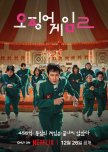
Squid Game Season 2
23 oamenii au considerat această recenzie utilă
The games are back. Are you ready to play?
Three years after the global success of *Squid Game* in 2021, the highly anticipated second season has arrived, bringing with it an even more intense and complex narrative. For those who loved the thrill of the first season, the second is sure to deliver more suspense and gripping drama. However, if you're not a fan of slow pacing or unresolved endings, you might want to reconsider watching it.Season two takes the deadly games to a new level, shifting the focus from mere survival to uncovering the dark forces controlling the brutal competition. While the season does move the story forward, much of it feels like a setup for the next season, which is slated for release in 2025. As a result, viewers may find themselves drawn into a long buildup, eagerly awaiting the big revelations.
The season starts with Seong Gi-hun, the sole winner from season one, reentering the game. The contest spans six days with six games, and the winner takes home 45.6 billion won ($31.1 million). The format feels familiar, but there are key changes that add both excitement and depth to the story. Notably, a new voting system allows players to decide whether to continue the game or stop it after each round. This dramatic twist adds chaos, greed, and moral dilemmas, with the prize money increasing as more players are eliminated. These elements provoke viewers to reflect on the cost of human greed and the lengths people will go to for money, even in a life-or-death situation.
Another significant shift is Gi-hun’s transformation. In the first season, he was a recipient of help, but in season two, he becomes the one offering assistance. Actor Lee Jung-jae delivers a powerful portrayal of Gi-hun’s internal struggle and determination as he navigates the complex moral questions surrounding the game.
While the season is rich in character development, those expecting non-stop action may be disappointed. The pacing is slower than season one, with more focus on the contestants’ backstories and philosophical themes about humanity, reality, and morality. This shift in tone is captured in poignant moments, such as when the Front Man tells Gi-hun, "The game will not end unless the world changes."
The new season also introduces a more diverse range of characters, each with their own personal stakes and motivations. From Hyun-ju, a transgender woman, to Yong-sik and Geum-ja, a mother and son, to Gyeong-seok, a father with a sick daughter, the show continues to explore deep human emotions and connections.
In terms of the games, season two mixes in new challenges, including traditional Korean childhood games like *gonggi* (Korean jacks), *biseok chigi* (hitting a stone slab), Ddakji, and *jegi chagi* (a game similar to hacky sack). While the new games add variety and interest, there is less focus on the game scenes compared to season one. The first major game, *Red Light, Green Light*, doesn’t occur until two hours into the season, and only three rounds of games are played, compared to the six in the first season. This slower pacing emphasizes the unraveling mystery behind the games rather than the action itself.
Despite the slower pace and cliffhanger ending, season two of *Squid Game* is still a thrilling continuation of the story. With larger sets, a bigger cast, and more complex themes, it builds on the legacy of the first season and leaves viewers eagerly anticipating what’s to come. But if you're looking for closure, be warned: the show ends on a major cliffhanger that will leave you wanting more.
Considerați utilă această recenzie?
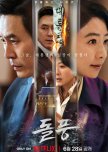
Acting battle between Sul Kyung-gu and Kim Hee-ae
"The Whirlwind" is a gripping political thriller that masterfully intertwines complex characters and relentless plot twists. It follows the intense power struggle between Prime Minister Park Dong-ho and Deputy Prime Minister Jeong Su-jin, each maneuvering through corruption, manipulation, and vendettas.The series excels in character development, portraying grey figures whose motivations blur the lines between good and evil. The pacing keeps viewers on edge, with each episode delivering new surprises and strategic battles. The show's strength lies in its ability to maintain suspense while exploring themes of ambition, morality, and the consequences of power.
With a dramatic and satisfying conclusion, "The Whirlwind" leaves a lasting impression.
Considerați utilă această recenzie?
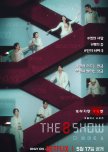
Această recenzie poate conține spoilere
The most realistic show ever
The 8 Show might seem like a pale nod to Squid Games, but to an extent it’s more nuanced and extravagantly structured, sans all the unflinching fatality because the small sample size naturally precludes elimination by death. rather than being packed with conflicts that highlight the friction between the good and bad, T8S is thematically predicated on class demarcations in a controlled microcosm of the society. far from being a mere depiction of moral erosion by virtue of greed, it simply mirrors the hierarchical propensity socially wired into us through eons of evolution. the paralel is uncannily resounding, as much as it’s painfully redolent.my interpretation of such parallel is as follows:
Floor 8: The wealthiest, holding in possession an abundance of resources, and given the scarcity of the resources, vested with shot-calling powers and the authority to dictate everything underneath them.
Floor 7: Government/Legislator, formulating laws and regulations at the behest and in the interest of the affluent few.
Floor 6: Police, enforcing brutality in the event of opposition or protests in service of its tyrannical government.
Floor 5: Pacifist who tries in earnest to strike a happy medium and go to bat for the common weal, but mostly stuck in between with resigned helplessness.
Floor 4: fence-sitting, slimy sycophant who’s ready to jump on the coattails of the dominant when it benefits them.
Floor 3: the down-and-out proletariat who works their fingers to the bones only to be perpetually trampled upon.
Floor 2: the heroic and altruistic figure who wants to defend the weak but finds themselves powerless anyway against the domineering coalition up top.
Floor 1: the physically disabled, habitually scorned and considered dregs of the society.
Ranking the Characters from Best to Worst (Spoiler Alert: None of Them Are Good People):
Floor 7: He may be the smartest in the room, but he's not very clever. There were plenty of solutions to problems that he was too lazy to consider.
Floor 3: Pure neutral. Despite being guilt-tripped into taking Floor 1's place, he shows his strong moral compass during the King incident.
Floor 8: A controversial opinion, but the group's initial alienation of her led to their downfall. She was overly helpful at first, figuring out how to add time and contributing the most to the talent show. Yet, they voted to punish her the next day? She was right to rebel against the system, in my opinion. Floor 6 is to blame for turning it into something more sinister.
Floor 2: Despite what eventually happens, her villainizing of Floor 8 set the tone for discord. Throwing a tantrum when free money is being thrown at you came off as petty.
Floor 5: She wasn’t fully aware of her choices.
Floor 4: Made her decisions to survive.
Floor 6: Self-explanatory. Horrible character all around.
Floor 1: This character frustrated me the most because everyone gave him so much grace. He's worse than Floor 6 because he knows what it's like to feel helpless and still chooses to act selfishly. Plus, going after Floor 4 instead of Floors 6 or 8 shows his lack of moral character since she clearly wasn’t the brains of the operation.
Considerați utilă această recenzie?

love, loss, and personal growth
Mr. Plankton tells the story of Hae Jo (Woo Do-hwan), a man with a terminal illness, who seeks closure by finding his biological father. His path crosses with his ex, Jo Jae-mi (Lee Yoo-mi), and they embark on a road trip, where they confront past regrets and their complicated feelings for each other. Jae-mi’s infertility and relationship struggles with her fiancé, Eo Heung (Oh Jung-se), add further emotional depth. In the series’ poignant finale, Hae Jo accepts his fate, while Jae-mi faces the difficult choice between her past and future. The ending offers a bittersweet but hopeful message about love, loss, and personal growth.Considerați utilă această recenzie?
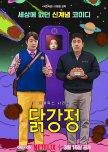
Chicken Gangjeong
4 oamenii au considerat această recenzie utilă
A perfect webtoon adaptation!
I started this show thinking it'd be just a gag, but there was a lot - sci-fi, 'punch in the gut scenes'... a very detailed show and a perfect weekend watch. Though there are some curses, so I'd not recommend watching it with kids.PS: The webtoon writer is really smart to even think of such a plot.
Considerați utilă această recenzie?
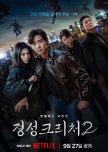
Gyeongseong Creature Season 2
8 oamenii au considerat această recenzie utilă
Această recenzie poate conține spoilere
A bad season!
After the first four episodes, I was well and truly invested. Although the modern-day setting lends the second season a different flavor, the callbacks and connections to season one occur gradually and organically, almost in sequence with Ho-jae's recovery of his memories.The episode three action sequences. I understand that shrouding scenes in darkness are true to how the lighting would look in those environments, but when it's coupled with the rapid editing style of the fight sequences, it sometimes makes it difficult to follow exactly what's going on in those scenes.
Obviously, the budget was on the finale so the fight sequences were quite better and well-lit. Other than that, no cliche plot lines and good integration of past to present timelines.
This season is edgier and the storyline seems more compelling. Also feel like the chemistry is off the charts this time. Though the first season had good world building and layered characters, while this one has the complete opposite.
Seong Jo's motivation is so fucking stupid.
Why did Chae-ok not keep tabs on Tae Sang. I get the melodramatic we can't be together sentiment, but you would still like to be aware of the love of your life being dead or alive, which in fact would have helped her realise that he's also like her now.
I loved the twists though.
Considerați utilă această recenzie?


 1
1





















